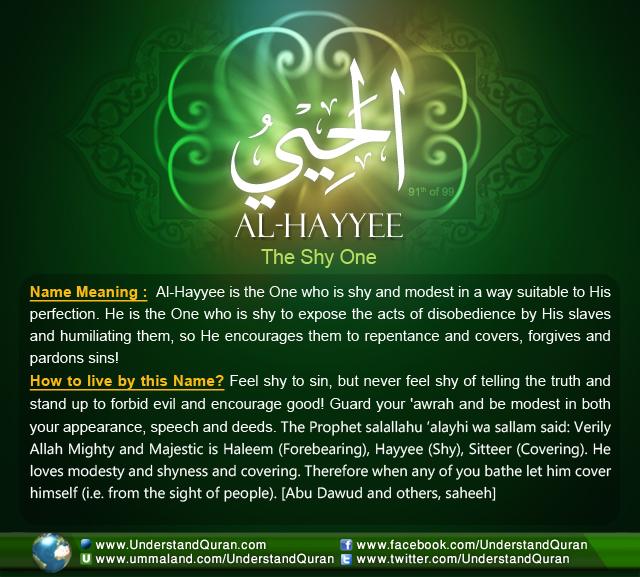And the Answer is . . . Al-Ghafoor!

Allah’s name Al-Ghafoor— The Forgiving, The Exceedingly and Perfectly Forgiving— occurs 91 times in the Quran. He is the One whose forgiveness manifests both quality and quantity. Al-Ghafoor is the One Who forgives, regardless of how large the sin is, and He forgives over and over again!
The Perfect Forgiver and Pardoner, the One Who Covers and Protects
Ghafoor comes from the root ghayn-faa-raa, which points to three main meanings. The first meaning is to cover, veil, conceal, and hide. The second meaning is to pardon, to forgive, and to set aright. And the third meaning is to cover a thing to protect it (from dirt).
This root appears 234 times in the Quran in nine derived forms. Examples of these forms are yaghfiru (He forgives, will forgive), wa-is’taghfir (and ask forgiveness), and maghfiratun (forgiveness).
Linguistically, both ghafoor and ghaffaar refer to the concept of maghfirah. Al-Ghaffaar refers to the fact that Allah forgives repeatedly (the quantity) whereas the name Al-Ghafoor points to the extent of His forgiveness (the quality). Allah’s name Al-Ghafoor does not just mean that He forgives us; He also protects and shields us from the consequences of our own actions. He does maghfirah— He covers our sins while being fully aware of what they are. His perfect forgiveness is truly a sign of His ultimate mercy for us!
Al-Ghafoor Himself says: Inform My servants that it is I who am the Forgiving, the Merciful [Quran, 15:49] . . . He causes it to reach whom He wills of His servants. And He is the Forgiving, the Merciful. [Quran, 10:107] . . . He said, I will ask forgiveness for you from my Lord. Indeed, it is He who is the Forgiving, the Merciful. [Quran, 12:98]
A Beautiful Combination: Al-Ghafoor and Ar-Raheem
In the Arabic language, for example in the name Ar-Raheem, the yaa indicates the continuity of Allah’s mercy. The name ﺍﻟﻐﻔﻮﺭ (Al-Ghafoor) on the other hand does not mean that He is always or forever forgiving, because then there would be no Hellfire. The waw in Al-Ghafoor shows us that Allah is exceedingly forgiving; He forgives beyond what any of us can expect.
One of the most common pairs is Allah’s name Al-Ghafoor combined with Ar-Raheem, which is repeated 72 times in the Quran, demonstrating that He covers these sins because He is so merciful to us.
An example of this beautiful combination is in one of the most hope-giving, heart-comforting ayaat in the Quran. Al-Ghafoor Himself says: Say, O My servants who have transgressed against themselves [by sinning], do not despair of the mercy of Allah. Indeed, Allah forgives all sins. Indeed, it is He who is the Forgiving, the Merciful. [Quran 39:53]
Instead of saying: O, you sinners! look at how gently Al-Ghafoor addresses us by saying yaa eebaadee, O my servants who have transgressed against themselves. Alhamdulillah; we have a Lord who is intensely forgiving and merciful to us.
How Can You Live by This Name?
1. Call upon Al-Ghafoor.
Call upon Al-Ghafoor when you do wrong to others or even to yourself, no matter how big or small the sin is. You can start your dua’ with this beautiful name. Always ask Him to do maghfirah on you (to cover up and forgive your bad deeds) and never give up asking. At the same time, never think of how big or little a sin is— think about the greatness of the One you are disobeying.
2. Never despair.
A characteristic of a true believer is that he or she never despairs. We don’t despair in the help of Allah ‘azza wa jall and we don’t despair in His mercy and forgiveness. This means that whenever we commit a bad deed– and because we are humans, we will sin– we don’t let it get us down but rather fight back by turning to Al-Ghafoor straight away and following up our sin with a good deed.
3. Train yourself to be forgiving.
Think of the forgiveness of Al-Ghafoor and be inspired to adopt a habit of being forgiving in your daily life. Always try to go to sleep with a heart clean of grudges. Hamdun al-Qassar, one of the great early Muslims, said: If a friend among your friends errs, make seventy excuses for them. If your hearts are unable to do this, then know that the shortcoming is in your own selves. [Bayhaqee] Always give others the benefit of the doubt, making excuses for them and never hunting for others’ mistakes.
4. Cover the faults of others.
Abu Hurairah, may Allah be pleased with him, reported: The Prophet sallallaahu ’alayhi wa sallam) said, Allah will cover up on the Day of Resurrection the defects (faults) of the one who covers up the faults of the others in this world [Muslim]. You know what Allah Al-Ghafoor will give you for covering up the faults and shortcomings of others in this world? He loves this quality so much that He’ll forgive your sins and not call you to account for your sins. If at all He will do so, He will not do it publicly so that you’re not embarrassed before others.
5. Don’t expose yourself.
The Prophet sallallaahu ’alayhi wa sallam said: Every one of my followers will be forgiven except those who expose (openly) their wrongdoings. An example of this is that of a man who commits a sin at night which Allah has covered for him, and in the morning, he would say (to people): I committed such and such sin last night, while Allah had kept it a secret. During the night Allah has covered it up but in the morning he tears up the cover provided by Allah Himself. [Al-Bukharee and Muslim]
When you commit a bad deed, do you feel ashamed? We should never like to express our sins and sin openly. You often see that people are even bragging about their sins, like being with women (or men), going out and dressing immodestly and gossiping about others. Imagine you tell others about your bad deeds, and they feel inspired to do it too. Never talk to others about your sins.
O Allah, Al-Ghafoor, we know that You are the most forgiving. No matter the size and amount of our sins, we call on You to forgive our sins, hide our faults from others, and protect us from the effects of our bad deeds in this life and the next, to support us in never despairing of Your mercy, and aid us in forgiving others, ameen!
And Allah knows best.
The Understand Quran Academy Team
PS: Did you sign up for our newsletter? Sign up now and receive the free welcome gift to the series The Names of Allah!










